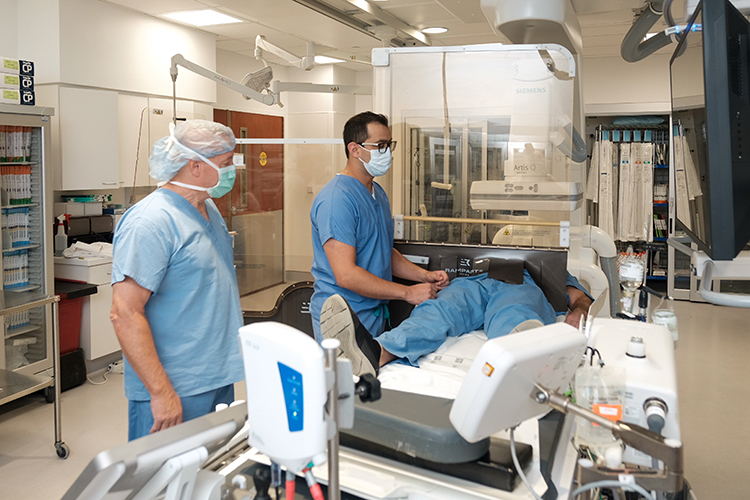
In the hospital world where patients are always the priority, it’s rare for a major investment to be made that primarily benefits physicians. But what helps doctors ultimately benefits patients, too. Thanks to a gift from the Welsh Foundation of Vero Beach, Cleveland Clinic Indian River Hospital became the first hospital in the state of Florida and the first within the Cleveland Clinic worldwide system to purchase a revolutionary “Rampart” device that protects healthcare workers from radiation exposure during catheter procedures.
For decades, interventionalists and staff relied on lead aprons to protect themselves from radiation in the cath lab. But over time, the weight of the aprons can cause fatigue and long-term injuries to the back and neck.
The Rampart is a device specifically engineered for interventionalists and cath labs to give physicians and their teams the freedom to work without the need for heavy lead aprons while protecting them from radiation.
Inventor Dr. Bob Foster was one of the highest volume interventional cardiologists in the country. He had been wearing lead aprons nearly every day for 20 years and, like 60 percent of interventional cardiologists, he fell victim to work-related back issues. He ruptured a disk which caused him to miss a month of work. Then he suffered another ruptured disk that caused a month-long paralysis in one leg, three months of missed work and two years out of the cath lab. Drawing on his own experience he and a team of engineers created the Rampart with one goal in mind – to provide apron-free protection for physicians.
“This device was launched about a year and a half ago, and after doing my research I felt it was a no-brainer for our cardiac team,” Dr. Carlos Gonzalez, a cardiologist at Cleveland Clinic Indian River Hospital, said. “Often our procedures last for three or four hours at a time and sometimes we’d wear the lead apron for 12 to 14 hours a day. It takes a toll on your body. Imagine the difference of working those long hours without the extra 20-pound lead apron on your chest. It’s a huge difference and it makes our job so much easier because we are more comfortable.”
The adjustable and motorized Rampart uses lead-equivalent acrylic panels that can accommodate the access point and the heights and widths of the doctor, technician and patient, protecting them from harmful radiation. Healthcare workers behind the panels get full body protection from radiation. The lead apron that was not only cumbersome but didn’t protect the arms and hands.
“I’ve always been an innovative thinker and when I was asked what we needed for the cath lab, I immediately knew that the investment in this device for our doctors would be a wise one. We’ve used the device for coronary angiogram, coronary intervention, Coronary Intervention of Chronic Total Occlusion (CTO), Watchman and MitraClip procedures.”
Occupational exposure to radiation is limited by federal regulations. According to a 2019 article in MIT News, the average exposure in the United States, from natural sources like cosmic radiation and radon, is 300 millirems per year at sea level. Higher elevations equate to higher exposure. Denver, for example, averages about 400 millirems per year.
The current federal limit of exposure per year for an adult (the limit for a worker using radiation) is not to exceed 5,000 millirems above the 300 millirems of natural sources of radiation.
Too much exposure can result in radiation sickness which will cause vomiting, nausea and diarrhea. Devices like the lead apron and the new Rampart system are designed to protect medical personnel working with X-rays from unnecessary radiation exposure.
“We now get the protection we need without the weight of the apron,” Dr. Gonzalez said. “Because our team is more comfortable, we can focus on doing what we do best and do it for longer than before. We are very grateful to the Welsh Foundation and Cleveland Clinic Indian River Hospital for this gift.”
Dr. Gonzalez earned his medical degree at Universidad Nacional de Colombia in Bogota, Colombia, and completed his internship in Internal Medicine at Lincoln Medical and Mental Health Center in New York. He also completed fellowships in cardiovascular imaging and interventional cardiology at Icahn School of Medicine at Mount Sinai, New York, and an additional fellowship in structural heart disease at New York University School of Medicine.
Dr. Carlos Gonzalez sees patients at Cleveland Clinic Indian River Hospital primarily on a referral basis. Talk to your primary care physician or cardiologist if you’d like to schedule an appointment. Or call the cardiothoracic surgery department at 772-563-4580 for more information.



